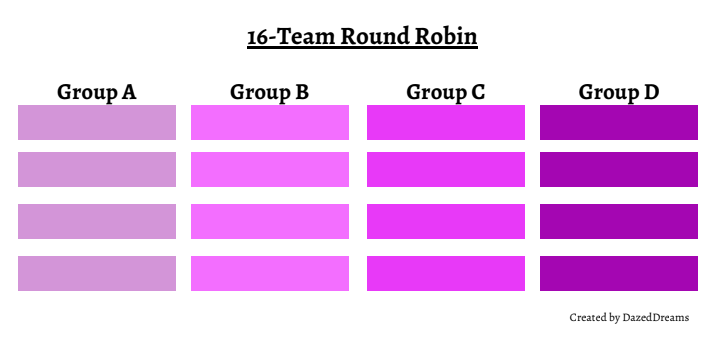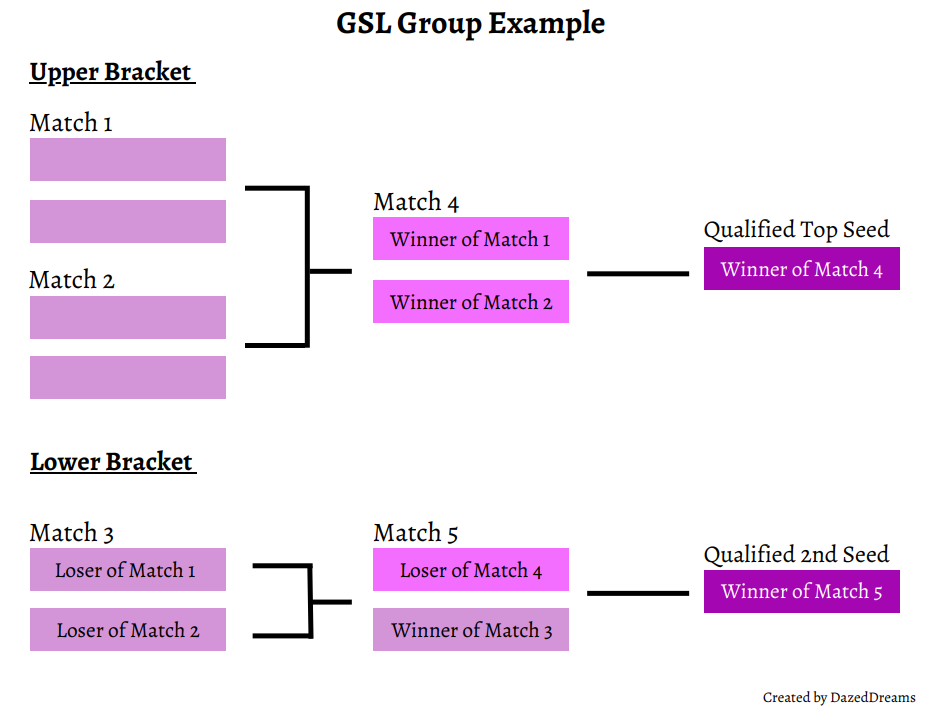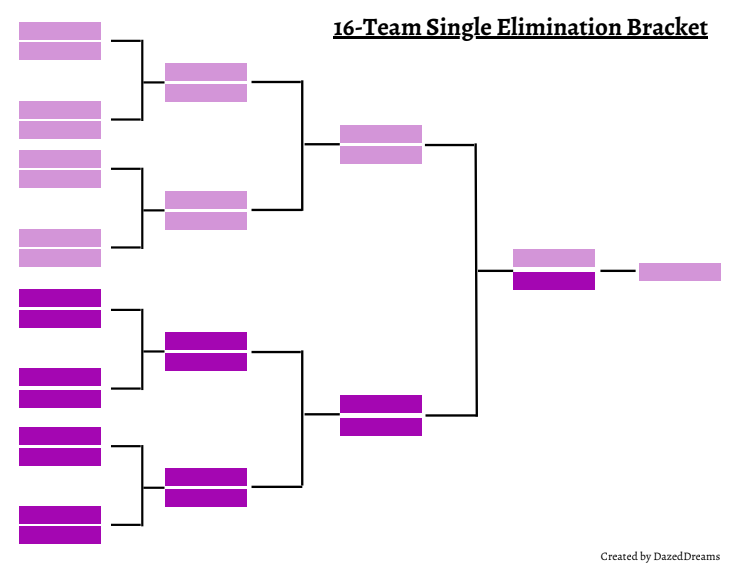October 5, 2023
Tournament formats and terminology can be confusing when you are new. Knowing tournament formats will help you gauge time commitment if you are a player. If you are a tournament organizer, knowing tournament formats will help you create competitions best suited to players, staff, and production. We will discuss the pros and cons of the round robin, GSL, swiss, single-elimination, and double-elimination. Thank Ali “aloe” Berkey, NerdStreet Gaming’s Esports Community Coordinator, for her insights on tournament organizing!
Seeding
Tournament organizers (TOs) will seed teams based on the team’s average rank or prior tournament placings. Some TOs will even ask for feedback from multiple teams before seeding goes live. If you are using global rankings, Ali suggests that you should consider only a team’s placing within the past month or two. Moreover, she emphasizes that every TO seeds different, and some may switch seeds during the group stage to avoid multiple rematches (i.e., changing Seed 1 from two different groups).
The highest-ranked team will be Seed 1, while the lowest ranking team will be the lowest seed. Teams will be matched up against each other based on their seeding. Usually, the highest seed and lowest seed will be matched against each other, the second-highest seed and the second-lowest seed will play against each other, and so on. This may seem unfair to the lowest seeds since they have to fight against the highest seed; however, this ensures that the best teams are not knocked out of the tournament in its early stages. As a result, the matches will become more competitive as the tournament progresses.
Multistage tournaments: What’s the main difference between Group Stage vs. Playoff Stage?
Multi-stage tournaments are often split into two separate phases: Group and Playoff Stage. The Group Stage is often formatted as a round robin, GSL, league, or swiss bracket. Teams will be separated into groups based off of their initial seeding. Tournament organizers decide how many teams will progress into the Playoff Stage in each group.The Playoff Stage is usually a single-elimination or double-elimination format. Teams will be seeded based on their results from the Group Stage.Because of the two stages, multi-stage tournaments are often broken up between two or more days.
**The Playoff Stage is not the same as the Main Stage. The Main Stage often refers to “the Finals portion of a multi-level tournament series”**
Different series types
Organizers use multiple series types to create the fairest, most time-efficient, and most competitive tournament for players. The most common series are best-of-one, best-of-three, best-of-five, and best-of-seven. When choosing a series for a tournament, it is important to know how long one average match lasts in the chosen game. For example, one match of Valorant averages around 40 minutes, while one match in Rocket League averages around 7 minutes. Therefore, a best-of-three for Valorant can last 2.5 hours, while a best-of-three for Rocket League can last 21 minutes. If you are planning a one-day tournament, it may not be efficient to do an entire Valorant bracket with every series being a best-of-three; however, it is possible to do so with a game like Rocket League, depending on the tournament format.
For players, knowing that each match is a best-of-three (bo3) can help you determine if you need substitutes. For example, if a Valorant tournament has three bo3 a day, you should accommodate an eight to nine-hour day, including delays.
Now, we can talk about each tournament format. Please note that graphics are based on a 16-team tournament.
Round Robin
For Round Robins, teams are split into groups based on initial seeding. Each team will match against each other at least once within the group. This format is usually used for a Group Stage. It gives competitors as many matches as possible without elimination within the Group Stage; however, this does mean that it will be the most time-consuming. Round Robins often require tournament organizers to use tiebreakers to determine first and second seeds, complicating the tournament more. As Ali noted, group stages are usually meant to eliminate some teams. During a Round Robin Group Stage, the Win-Lose ratio determines who makes it out of the group.

GSL
Like the Round Robin format, GSL also requires teams to be split into groups, specifically groups of four; however, unlike the Round Robin format, GSL will always have elimination matches. Instead of three guaranteed matches, teams are guaranteed two. This format will also garner more competitive games and reward the team that 2-0’s in the upper bracket. Unlike a standard double-elimination bracket, GSL will have two qualifying spots instead of one winner: Upper Qualifier and Lower Qualifier. This means that there are no tie-breakers, unlike the Round Robin format.

Swiss
Ali notes that “…The Swiss Stage can be used in place of a Group Stage; however, it is not the same as all teams can play against one another in Swiss.” Recently, North American Game Changers changed their Group Stage from a GSL format to a Swiss Stage. Here is her explanation for this tournament format change:
“Swiss provides more opportunities for teams to play in the tournament setting versus GSL. With Swiss of 32, teams qualified after three wins and were eliminated after three losses. This guarantees three matchups per team competing in the tournament, identical to a Round Robin stage. However, the difference between the two formats is that in Swiss you have a chance of playing any team. 1-0 teams would play other 1-0 teams, while 0-1 teams would play other 0-1 teams. In Round Robin, teams are locked into the three other teams they would play. This provides an advantage to the higher seeded teams in Groups, as they will not have to face off against another team of their skill level until the Playoff Stage.
In Swiss round 3, we see the first potential eliminations of the 0-2 teams and the qualifications of the 2-0 teams, meaning they are playing other teams of the same record and possibly skill level. Swiss provides a heightened competition experience as well as an equal matchup opportunity. The disadvantage to Swiss is the same as the advantage as it is an objective opinion based on each team’s skill level. More games played equals more opportunities to compete. However, some teams may find playing more games than a Round Robin/GSL stage more annoying. Other teams will appreciate the extra chances they have to qualify for Playoffs.”
League
The League format is usually a double Round Robin where teams face each other twice in their respective groups. Usually, these matches are extended across multiple weeks. This format is great for teams because the time commitment is not as extensive as a one-day or two-day tournament.
Single-Elimination
“Single elimination is exactly what it sounds like, you lose, and you move onto the next round.” Sometimes there is a 3rd-place decider match. Regardless, this format is the fastest to go through, depending on the game and series type.

Double-Elimination
“Double-Elimination has two brackets, a Top or Upper bracket which everyone starts from. If you win your matchup, you continue to move forward in the Top/Upper bracket. After the first round, losing teams will move into the Lower or Losers bracket. As teams lose in the Upper bracket, they move into the Lower bracket and will play the teams that win their Lower bracket games. Finally, the winners of the Upper bracket and Lower bracket will play one another for the Grand Finals.”
Unlike a single-elimination format, teams get one more chance in a double-elimination format. This does mean that double-elimination tournaments may take longer than single-elimination tournaments.
Getting started in tournament organizing
Do you have any advice for new individuals wanting to get into tournament organizing?
“Volunteer and ask questions. If you have never worked as an admin for a tournament before, the first step is getting your foot in the door. I would say volunteer for a handful of events to get a grasp on an admin’s requirements. However, each game is different, so it is important to recognize that what you learn for one tournament will not work for another. Once you have a few events under your belt, have a resume prepped with those events when going for admin roles.
It is hard to jump into a tournament organizer role without experience in a few games and different formats, so I recommend paid admin as your next step before making that leap. The more experienced, the better before jumping into the lead TO role, but realistically you can make that call when you think you are ready for it. I had admined multiple games before leading my first tournament, and it helped strengthen my confidence in issuing rulings and managing the execution of the event.”
Did you think you would be where you are now at NerdStreet?
“Absolutely not. If you told 22-year-old me that in a few years I would be running the largest North American Valorant tournament for women and non-binary players, I would have thought it was a prank. When I first started at Nerd Street, I was also trying to secure myself as a professional streamer during my free time. I was a part of the stream team and attempted the whole “streamer” thing, working with Logitech, doing charity streams for St Jude, and going to conventions. I had terrible imposter syndrome and began to wane off of streaming as I grew insecure that others would think I was unprofessional for streaming and working in the same industry.
I threw myself into my work as an excuse, and now here we are. I miss streaming a lot, and am planning to get back into it for myself in the future, but boy, was I an insecure mess when I first started this job. Be wary of imposter syndrome. It can kick you in.“
About Ali “aloe” Berkey
Ali “aloe” Berkey works for NerdStreet as their Esports Community Coordinator. Before attaining her current position at NerdStreet, she switched jobs within the company, like social media intern and store manager.As a store manager, she gained more experience with tournament and event operations. However, when everything went into lockdown in 2020, Ali “…couldn’t shake the feeling that [she] was useless as a store manager with no store to manage.” As a result, she started to ask NerdStreet’s tournament operations team if they needed any help with their tournaments.Eventually, she became a tournament admin and organizer for NerdStreet. She’s worked on a wide range of events like VCT NA and VCT Game Changers; however, one of her favorite events was the weekly Minecraft Tournaments, where she helped build servers and kept track of stats. Currently, she focuses more on the community aspect of NerdStreet’s esports; however,she still lends a hand to NerdStreet events and still is the tournament organizer for Game Changers.
I want to give Ali “aloe” Berkey a huge thank you for helping me write this article! Make sure to send her love. If you want to read more of my articles or see my esports news, check out my Twitter.